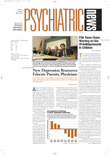All psychotherapies are based on the premise that people can change their thoughts, emotions, and behaviors. But to what extent are people really open to change?
Not all that much, Bruce Wexler, M.D., a professor of psychiatry and a brain-function scientist at Yale University, argues. All of us like a little novelty, and some of us like a lot, but generally “most of us seek the familiar most of the time.”
Wexler presented data to support his position at the American Psychoanalytic Association meeting in New York City in January at the seminar“ Neuroplasticity Over the Life Span: How People Can and Can't Change.”
For example, brain-imaging data in both humans and animals show that early life experiences—sensory inputs—are indispensable in shaping brain formation and function. Further, brain neurons have been found to be most readily formed and reformed in both humans and animals prior to sexual maturity. The frontal and parietal lobes—the brain areas that most distinguish humans from other primates—are the last to mature, doing so around age 21. Therefore, while adults can learn and make brain changes, Wexler concluded, it is more difficult for them than for children and teenagers because adults' brain structures are essentially formed.
And once people's brain structures are formed, Wexler posited, they tend to seek sensory inputs consonant with those structures—for example,“ Democrats marry Democrats, and Republicans marry Republicans.”
In one experiment, subjects were found to prefer those letters of the alphabet that they had viewed the most often during the test. In another experiment, men were found to look more at ads of the car model they owned than at ads of other car models.
Further, if people are faced with situations in which there is a mismatch between their brain structures and their sensory stimuli, it can prove unpleasant or unsettling, Wexler asserted.
One example of where sensory inputs no longer match brain structures and where the mismatch can be traumatic for people is bereavement. Sensory inputs of the beloved are gone forever, so that “all of the internal representations of the deceased have to be reworked.” Another instance where the clash between brain structures and sensory inputs can be very troubling is immigration. That is why immigrants often surround themselves with fellow immigrants and objects from their homeland, he said.
And of course, psychotherapy can be highly anxiety provoking, Wexler declared. “We want to create change, to alter brain structures, which is painful and difficult for people.”
In psychoanalysis, the transference reflects the patient's brain structures, and the challenge is changing those structures first, then the transference.
Nonetheless, over a period of time patients in psychotherapy will probably come to feel comfortable, Wexler opined, and this comfort level should help pave the way for change—for “a paradigm shift.” ▪
